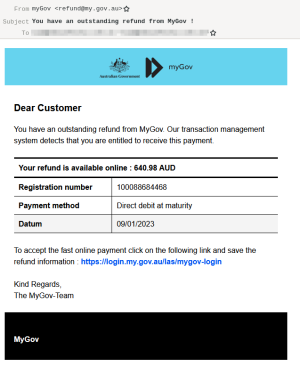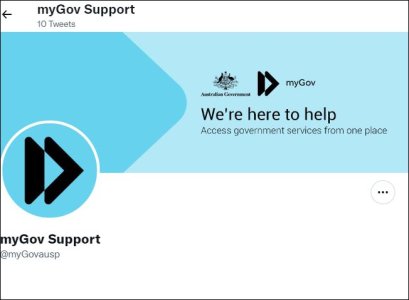Don't Be a Victim: myGov Email Scam Returns to Australia - Learn How to Spot the Fraud
- Replies 17
As if the cost-of-living crisis isn’t bad enough, now there’s been reports of yet another email phishing scam doing the rounds, preying upon innocent Aussies.
Cybersecurity firm MailGuard warned that the latest cybercrime scheme comes with the subject line: ‘You have an outstanding refund from myGov’.
‘Cybercriminals are well aware of the financial difficulties that many Australians are currently facing and are taking advantage of this,’ the company said.
The email tells the recipient that they have a refund of $640.98 from myGov and the user is then instructed to click a link that promises a ‘fast’ payment.
More concerningly, the email appears to be sent from ‘myGov’ with the address ‘refund[at]my.gov.au’.
MailGuard says this could easily fool any unsuspecting individual as the email address used in the scam is similar enough to the legitimate myGov email address.
The link will direct the user to a page designed to look like the legitimate myGov login page, which first asks for vital details such as one’s myGov username and password along with their full name, address, phone number, and credit card details.
The cyber criminals behind the scheme will then use these details for their own personal financial gain, or worse, sell them on the dark web.
‘If entered, these will be harvested by the cybercriminal and stored for later use,’ MailGuard said.
They also pointed out that the scam website even claims to send users a code after giving out the requested information, but it is unknown what it specifically does.
Aussies who receive the myGov scam email are advised not to click on anything on it and simply delete the message.
According to data from ScamWatch, Aussies lost $568.7 million to scams in 2022, $3.3 million of which scammers gained by using rebate scams.
Now, some of you might be thinking ‘That scam’s been going around for some time, how is this news?’
Well, you’re right, in a sense. We’ve shared news of scams using myGov in 2022 and 2021.
The tricky thing with scammers and cybercriminals though is that they will resort to using the same tactics at opportune times to maximise their chances of victimising people.
In this case with reports of potential price increases brought upon by supermarkets ceasing their price freezes (Coles ended up extending its own though!), who wouldn’t want an extra $600?
Then there’s also the scams that pop up just after major disasters hit Australia that most disappointingly prey on kind-hearted people just looking to offer a helping hand.
That’s why it’s important to be kept abreast of scams in all their nasty iterations — no matter how slight the changes may seem.

Always remain vigilant --- the more you know about cybercrime the better. So here are a few tips on how to spot a ‘phishing’ email aside from what MailGuard already said:
1. Check the sender’s email address. If it’s suspicious, don’t open it.
2. Watch out for urgent requests and generic language.
3. Check for spelling errors, those behind the scam may not set up the email with great attention to detail.
4. If the email says it's from a legitimate organisation, go directly to their website using your own bookmark and login.
Members, this scam is both scarily believable and potentially dangerous. Many of us could be tempted by the lure of an easy refund, but it’s important to remember that if something looks too good to be true, it probably is.

Be informed of the latest scams going around at our Scam Watch forum too:
Share your stories and experiences with us in the comments below!
Cybersecurity firm MailGuard warned that the latest cybercrime scheme comes with the subject line: ‘You have an outstanding refund from myGov’.
‘Cybercriminals are well aware of the financial difficulties that many Australians are currently facing and are taking advantage of this,’ the company said.
The email tells the recipient that they have a refund of $640.98 from myGov and the user is then instructed to click a link that promises a ‘fast’ payment.
More concerningly, the email appears to be sent from ‘myGov’ with the address ‘refund[at]my.gov.au’.
MailGuard says this could easily fool any unsuspecting individual as the email address used in the scam is similar enough to the legitimate myGov email address.
The link will direct the user to a page designed to look like the legitimate myGov login page, which first asks for vital details such as one’s myGov username and password along with their full name, address, phone number, and credit card details.
The cyber criminals behind the scheme will then use these details for their own personal financial gain, or worse, sell them on the dark web.
‘If entered, these will be harvested by the cybercriminal and stored for later use,’ MailGuard said.
They also pointed out that the scam website even claims to send users a code after giving out the requested information, but it is unknown what it specifically does.
Aussies who receive the myGov scam email are advised not to click on anything on it and simply delete the message.
According to data from ScamWatch, Aussies lost $568.7 million to scams in 2022, $3.3 million of which scammers gained by using rebate scams.
Now, some of you might be thinking ‘That scam’s been going around for some time, how is this news?’
Well, you’re right, in a sense. We’ve shared news of scams using myGov in 2022 and 2021.
The tricky thing with scammers and cybercriminals though is that they will resort to using the same tactics at opportune times to maximise their chances of victimising people.
In this case with reports of potential price increases brought upon by supermarkets ceasing their price freezes (Coles ended up extending its own though!), who wouldn’t want an extra $600?
Then there’s also the scams that pop up just after major disasters hit Australia that most disappointingly prey on kind-hearted people just looking to offer a helping hand.
That’s why it’s important to be kept abreast of scams in all their nasty iterations — no matter how slight the changes may seem.

People aged over 65 were the largest demographic in terms of reported scams and money lost for 2022 according to ScamWatch data. Stock Image Credit: Pexels/Andrea Piacquadio
Always remain vigilant --- the more you know about cybercrime the better. So here are a few tips on how to spot a ‘phishing’ email aside from what MailGuard already said:
1. Check the sender’s email address. If it’s suspicious, don’t open it.
2. Watch out for urgent requests and generic language.
3. Check for spelling errors, those behind the scam may not set up the email with great attention to detail.
4. If the email says it's from a legitimate organisation, go directly to their website using your own bookmark and login.
Members, this scam is both scarily believable and potentially dangerous. Many of us could be tempted by the lure of an easy refund, but it’s important to remember that if something looks too good to be true, it probably is.
Key Takeaways
- Aussies have been warned to be on the lookout for a myGov email claiming they are eligible for a $640 refund.
- The email may appear to be from myGov but is actually from a cybercriminal trying to harvest personal information.
- The user is instructed to click a link which will direct them to a fake myGov login page and enter their username and password.
- The potential victim is then asked to enter personal details, such as full name, address and phone number, which will be harvested by the criminal and used for financial gain.
- It is important to be aware of phishing attempts and other scams that claim to offer refunds.
- Australians lost $3.3 million to rebate scams in 2022 according to ScamWatch data.
- ALERT! Sunrise Star David Koch Reveals How His Image is Being Used to Scam People
- New 'Celebrity Scams' doing the rounds: Facebook forced to remove ads featuring fake images of PM Albanese getting 'arrested'
- Protect yourself now! Aussies targeted by 'despicable' Facebook Real Estate Scam
Share your stories and experiences with us in the comments below!









